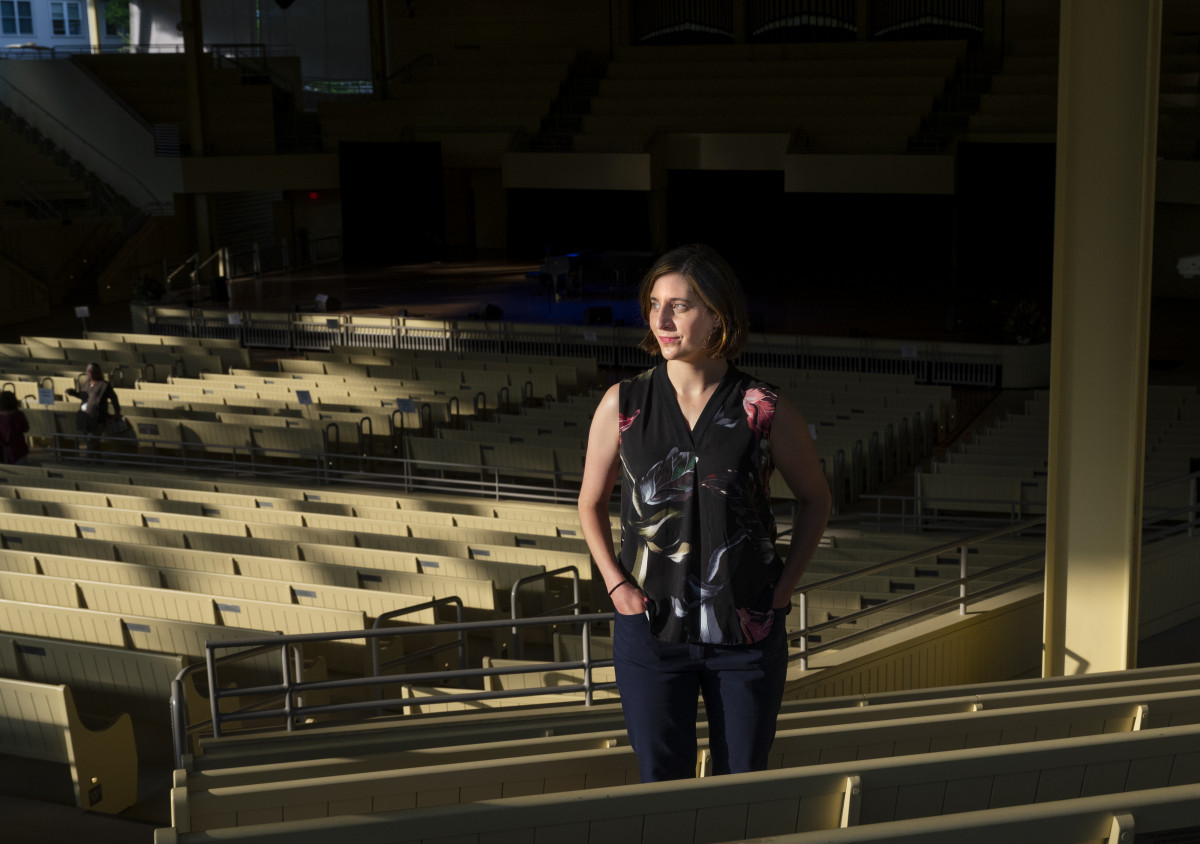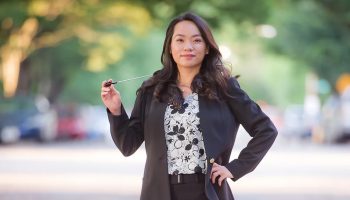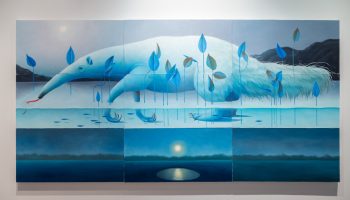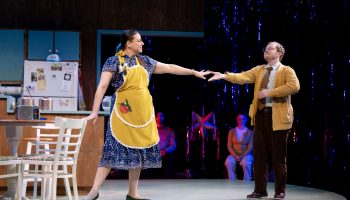When a person has their first impactful experience with the arts, it often leaves them with an insatiable craving for more. For Laura Savia, the new vice president of performing and visual arts at Chautauqua Institution, it led to a lifelong pursuit to create that experience for others.
Savia’s first formative experience with the arts took place during a school field trip to the Indiana Repertory Theatre. She sat in the gallery and gazed upon the production of The Red Badge of Courage.
“Something about the conviction of the actors, the simplicity of the staging and the power of storytelling is imprinted on my heart forever,” Savia said. “I try to remind myself, and I try to remind our team, that on any given day at Chautauqua, someone’s having that experience, without a doubt. Someone, somewhere, today will have that first indelible experience with art.”
Savia was appointed to the vice president position in March 2022 after an extensive, nationwide, five-month-long search to fill the position.
“Laura practically sparkles with a passion for art, artists, performance and process,” said Deborah Sunya Moore, senior vice president and chief program officer, and Savia’s predecessor. “This position has enormous responsibility as it oversees over 500 persons from resident companies to our schools to guest artists. … She really comes at it with a commitment to artistic quality, but I would say also a commitment to people.”
Raised by two classical musicians, a violinist and a conductor, Savia seemed destined to lead an accomplished life within the arts.
“My parents’ dedication to music and the arts shaped me. I was forged in the oven of love, hard work and respect for art,” Savia said. “My parents imbued in me a respect for discipline and technique.”
Savia recalls nights when her parents would workshop a difficult passage for hours until it was perfected.
“The other thing my parents instilled in me was that the arts belong to everyone,” Savia said.
Both of her parents worked to educate and provide children with access to music, through public schools and orchestra programs.
When Savia attended high school in Evansville, Indiana, she took advantage of several artistic offerings. She played violin in the orchestra and became involved with theater and the summer musical program.
“Anything related to theater, I dove into. I already knew by high school that I would want to major in theater and pursue it professionally,” Savia said.
Savia would soon find herself in a theater program at Northwestern University, which was ranked “the second best undergraduate drama school in the world’’ in 2016 by The Hollywood Reporter.
“I received a scholarship to Northwestern University, without which my family wouldn’t have been able to afford that education. And the four years there in a liberal arts setting, as opposed to a conservatory, just cracked everything open for me,” Savia said. “That’s when I found directing. That’s when I found arts administration. That’s when I started experiencing community engaged theater, and I really never looked back.”
Graduating with a degree in theater, Savia has spent the last 20 years in the professional theater world. Almost directly after college, she began to work with Atlantic Theater Company; she was there from 2004 to 2009, which was a pivotal time for the company.
“That was a time of explosive growth for Atlantic Theater Company, largely because their profile shot up when they produced Spring Awakening,” Savia said. “Spring Awakening was a world premiere musical. I worked tirelessly on it for two years on the artistic producing team, and it became a smash hit on Broadway.”
After the success of Spring Awakening, Savia began to understand why newly released work and world premiere work is the “center of gravity in the American theater.”
New work allows playwrights, composers, actors, directors and others to collaborate and tell a new, impactful story to audiences.
“There’s a usefulness for you as an artistic administrator when you are providing incubation opportunities for great minds, who are taking risks by writing something new,” Savia said. “That’s why I’m so excited about the residencies we’re starting to offer in the fall, winter and spring at Chautauqua. That’s that incubation time. The next Hamilton might be developed here, the next Spring Awakening.”
For the next decade, Savia would work with the Williamstown Theatre Festival, which The New York Times has coined “a theatrical powerhouse.” In between her roles with the two theater companies, Savia was a freelance director. But at the Williamstown Theatre Festival, Savia played a major role in programming, producing and casting the festival’s seven show seasons and organizing the special events.
“At Williamstown, I always said they produced a year’s worth of theater in nine weeks,” she said. “Here, we produce a year’s worth of art, in all disciplines, over nine weeks.”
A number of Williamstown productions Savia oversaw received multiple awards and were transferred to Broadway and off-Broadway stages. Some notable productions include Bess Wohl’s Grand Horizons, Adam Rapp’s The Sound Inside and Martyna Majok’s Cost of Living. One of the most meaningful productions to Savia was The Rose Tattoo, by Tennessee Williams.
“Tennessee Williams’ language felt like it was written yesterday; it became incredibly fresh,” Savia said. “And of course, we were still honoring the period and the cadence. And that show transferred to Broadway.”
Savia also founded Community Works, which is Williamstown’s radically inclusive, year-round community engagement initiative for theater.
“I created (Community Works) in 2016, and that is still happening today,” Savia said. “That involves people from all walks of life, participating in year-round theater workshops, not only as learners but also as performers in a culminating show every summer.”
Community Works is similar to one of the initiatives of Chautauqua’s 150 Forward strategic plan, which calls for year-round residencies and partnering with the likes of the YMCA, Dwyer Program and other community programs.
Beyond her work directly in theater, Savia has also taught in New York City public schools, as well as at the university level with Fordham University and The Lee Strasberg Theatre & Film Institute, which is part of New York University’s undergraduate theater program.
“(Teaching at public schools) really affirmed for me this core belief that art is the birthright of every human being,” Savia said. “So I am still discovering in what ways teaching might be able to manifest for me here at Chautauqua Institution, and because it’s a place of lifelong learning, I am confident I will find the right outlets. And I must, because (teaching is) a real engine in my life.”
After the pandemic, Savia did some soul-searching and realized she wanted to reevaluate what she wanted to pursue next.
“Did I want to go deeper on the path I was on in theater or broaden? And I felt very, very called to serve in a way where the platform was more broad,” Savia said. “I saw the Chautauqua listing for vice president of performing and visual arts. And of course, I knew about Chautauqua, mostly through theater colleagues because Chautauqua Theater Company is very well respected.”
Now that Savia has joined Chautauqua’s administrative staff, she is responsible for overseeing a number of different areas beyond just theater. She supervises all performing and visual arts activities, making her responsible for the Chautauqua Symphony Orchestra, Chautauqua Opera Company & Conservatory, Chautauqua Theater Company, Chautauqua Visual Arts programs, Chautauqua Festival Schools of Performing and Visual Arts, and other series in dance, chamber music and family entertainment.
“The amount of events that the performing and visual arts department oversees is colossal,” Savia said.
Rather than working on each specific subsection of the arts, Savia supervises a team of artistic administrators, which she said are “truly incredible and probably have a combined 100 years of experience here.”
So far, Savia has found Chautauqua’s aura to be inquisitive and warmhearted.
“I haven’t been here that long, but I’ve already figured out that Chautauquans are the most intellectually curious, generous people,” Savia said.
For the past 17 years, she has lived and worked in New York. Comparing the bustling of the city to the calm of the lakeside, Savia is looking forward to adapting to a new environment and pace of life.
“I love New York City, and it has shaped me in many ways. But it has never completely felt like home,” Savia said. “It has never felt like the place I wanted to spend the entire rest of my life.”
She is most excited to have her 14-month-old daughter, Zoë Elizabeth Gerbaud, be immersed in the educational and recreational opportunities Chautauqua provides.
“Chautauqua, in a way, feels like a perfect place for me because there is the intellectual rigor and cultural smorgasbord here that one can find in New York City. … But in my opinion, the quality of life here and the ability to prioritize family, prioritize recreation and self-care is just higher here,” Savia said.
Savia said Zoë has already had a few of her first Chautauqua experiences with arts and recreation, from live music and plays to mime performances, in the matter of one week.
“I am so excited for my daughter Zoë to grow up at Chautauqua. … She’s having all these firsts and she’s coming into community here in a way that hasn’t been possible as robustly in the New York City area,” Savia said. “Being able to have a nourishing environment for my daughter is a big part of why I said yes to this job, and it has just exceeded my expectations already.”
On a personal level, Savia is excited for several of the artistic events offered at Chautauqua, specifically both the Guest Artist and Resident Artist Chamber Music Series.
“Chamber music has not been a part of my life in recent years. … When I was a little girl, my mom used to gather her musician friends to play quartets for fun in our living room,” Savia said. “So, I’m going to get emotional, but in a way, I do feel a homecoming to chamber because I was around great chamber music, and perhaps even took it for granted, when I was younger.”
In her role, Savia hopes to continue Chautauqua’s history of impactful leadership while inspiring others.
“I am really passionate about mentoring female-identifying and non-binary folks who are at the beginning of their career, or maybe stepping into a new chapter in their career,” Savia said. “It is a personal goal for me to pay forward the mentorship that I received and to create opportunities that are responsive to emerging leaders’ talents and strengths, and also to challenge them.”
She also hopes to continue the innovative vigor and aspirations of Chautauqua Institution’s founders, Lewis Miller and Bishop John Heyl Vincent.
“(Miller and Vincent) were really the vanguard of some progressive ideas around religion and education,” Savia said. “I do take seriously the role I am called to play in being a steward of the traditions here and the missions. I’m trying to find and forward the right innovations to be as bold as they were.”





